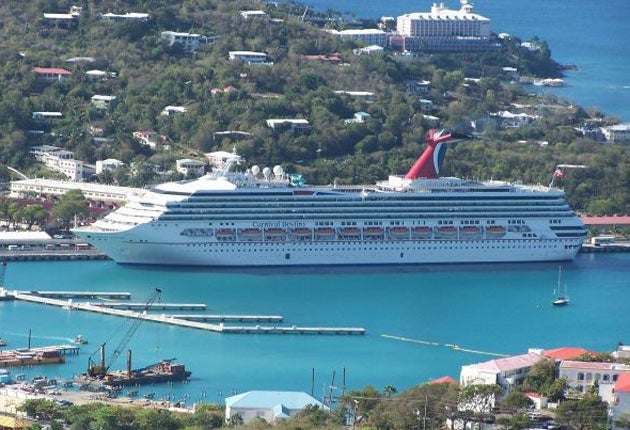The good life – the future of rock'n'roll
Touring was supposed to be the music industry's financial saviour, but now even gigs are losing their allure. So can packing fans on to a cruise liner pay dividends? Gillian Orr finds out

Next January a cruise ship will set sail from Miami, making its way down to Cozumel, an island off the Gulf coast of Mexico, carrying on board the alternative rock band Weezer and up to 2,800 music fans.
The American quartet has also invited along more than a dozen bands to play on board during the five-day event, including Dinosaur Jr, The Antlers and Yuck. Creating a sort of "festival at sea", all the artists will perform a number of times on the ship's four stages, meaning passengers should get an opportunity to see each band at least once.
Various activities are also organised, giving the trip a camp-like feel and allowing artists and fans a chance to connect. There is absolutely no getting on and off the ship.
Traditionally, live entertainment thrives during hard economic times, but it's been suggested that the current recession is finally catching up with the concert industry. Bands are increasingly turning to new ways of touring to ensure they sell out their concerts and provide fans with innovative ways to see them live.
At the Great Escape Festival in Brighton in May, Chris Carey, economist for the Performing Rights Society for Music, told the conference that despite the recent boom in concert attendance, there was evidence that the European live music market was slowing down, although he predicted it to be "a blip".
Due to the steady decline in sales of recorded music, live shows have often been cited as the greatest strength of an industry experiencing major financial problems. But in 2010, overall live music revenues dropped by 6.7 per cent and Carey cited high-profile examples of artists whose tours had failed to live up to expectations, including Bon Jovi failing to sell out multiple dates at London's 02 Arena and Paul McCartney tickets being available for less than face value.
And it's not just band tours, festivals are also struggling to sell out in an increasingly saturated market. Even Michael Eavis has expressed concerns over the future of the biggest festival on the calendar, Glastonbury. "Partly it's economics but there is a feeling that people have seen it all before," he told The Times last month. "We've probably got another three or four years. Womad and Latitude are not selling out." (Latitude Festival did eventually sell out.)
A number of music fans put the drop in interest to see bands play live down to extortionate ticket prices and the fact that big artists routinely perform the same old, tired setlists.
Despite dating back to the Seventies, Steely Dan showed themselves to be a modern band on their most recent tour – once punters had bought a ticket, they had the opportunity to vote online for what songs the band should play, ensuring a satisfied audience. David Gray and the Pixies are other examples of established bands that have "crowdsourced" their setlists at recent gigs.
Enjoy unlimited access to 70 million ad-free songs and podcasts with Amazon Music
Sign up now for a 30-day free trial
Enjoy unlimited access to 70 million ad-free songs and podcasts with Amazon Music
Sign up now for a 30-day free trial
Another strategy that has proven popular is for bands to perform classic albums in their entirety, as pioneered by All Tomorrow's Parties' Don't Look Back series. Primal Scream recently took advantage of this by extensively touring their 1991 album Screamadelica. Other examples include Snoop Dogg recently performing the whole of his debut 1993 album Doggystyle at the Lovebox Festival in east London and Suede playing their entire first three albums over three separate dates.
This need to reinvigorate the live arena is something that Sixthman, the company behind the Weezer cruise, understands. They have been organising similar events for the last 10 years, and have partnered with John Mayer, Lynyrd Skynyrd and Kid Rock on his annual Chillin' the Most cruises.
The cruise is a fairly typical move from Weezer, who are known for their idiosyncratic approach to the industry. Not only did they devise a clever cross-promotional strategy by naming their album Hurley after Jorge Garcia's character on the television show Lost, a close-up photograph of the actor also adorned the album. But the cruise is perhaps the most unusual strategy the band has taken to connect with fans so far.
Andy Levine, founder of Sixthman, says: "Bands have been looking for ways to energise their core fan base and to say thank you to them because they bring so much energy to their career."
Prices for the cruise start at $740 (£454) based on five people sharing a cabin and go up to $2900 (£1780) for a double suite with sea views, and ticket sales are solid.
"[Fans] are coming just to show respect and to say thank you and to see what it feels like to be hanging out with their favourite bands on vacation," says Levine.
Subscribe to Independent Premium to bookmark this article
Want to bookmark your favourite articles and stories to read or reference later? Start your Independent Premium subscription today.

Join our commenting forum
Join thought-provoking conversations, follow other Independent readers and see their replies